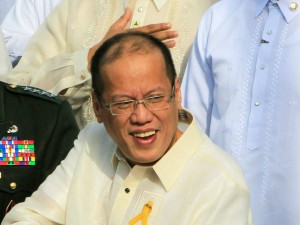‘Spratlys cop’ role for US—DFA
Let the United States police the disputed waters of Scarborough Shoal and keep the peace.
Thus, President Benigno Aquino’s plan to ask the United States to deploy spy planes over the West Philippine Sea (South China Sea) should not be seen as an escalation of tensions between the Philippines and China, the Department of Foreign Affairs (DFA) said Tuesday.
“As a treaty ally, the US has been assisting us in developing a minimum credible defense posture and that includes maritime domain awareness and surveillance reconnaissance as well as intelligence gathering,” DFA spokesperson Raul Hernandez told reporters.
He said the flybys would only be for surveillance and monitoring.
“We are just monitoring what is happening in our areas, in our territories,” Hernandez said, stressing that these activities were a sovereign prerogative. He said he had no further details on Mr. Aquino’s plan.
Article continues after this advertisementSenator Gregorio Honasan on Tuesday welcomed the President’s move and even suggested that the United States could redeploy to Scarborough Shoal some of its units currently in Mindanao under the Visiting Forces Agreement.
Article continues after this advertisement‘Barangay tanod’
“In a bilateral situation, there should be a parity of forces, of leverage. But in our case with China, there’s none. That’s why I need to underscore the need for a third party, an observer,” Honasan said.
“They’ll be the ‘barangay tanod.’ They’ll be the police. They will monitor everything. Any movement of naval and air assets in the area will be monitored by the US,” he added.
“If there’s a violation of the initial agreement, of ground rules, there would be a disinterested party that would call the attention (of both countries), and I think the US fits that role.”
In an interview with Reuters on Monday, Mr. Aquino raised the possibility he would request “overflights” in the area where the Philippines and China have been locked in a standoff over Scarborough Shoal sparked by the poaching of marine life by Chinese fishermen.
The United States has declared its neutrality in the dispute, and China has warned against the involvement of “external forces” in the confrontation.
“But the question really is: What do we do with that information?” Honasan, a former Army colonel, told the Philippine Daily Inquirer in a phone interview. “If they would just feed us information that there’s an intrusion but the Americans would do nothing, useless.”
Honasan said Washington could send a “carrier task group” composed of an aircraft carrier and destroyers to police the area where the Philippines had accused China of harassing its vessels.
Clarify US position
He said the US military presence would help “level” the field between the Philippines and China, which boasts of a much stronger military.
But Honasan said the Philippine government should first clarify the US position on the dispute.
“We have to ask the US: Do they believe that the Scarborough Shoal belongs to us? I think we should get a categorical answer from them,” he said.
“If they say it belongs to China, it’s over. Let’s go home,” he said. “Now if they believe that it belongs to the Philippines, help us put up structures there and deploy your troops there. Establish a naval component there as a monitoring device for your deployed air and naval asset.”
Honasan said the Scarborough dispute would allow the Aquino administration to “test” whether the United States placed more value on its historical ties with the Philippines than its relationship with China.
The Philippines should also conduct “backdoor diplomacy” with China over the possibility of a joint exploration of the disputed territory, the senator said.
“This is not a simple issue,” he said.
No plan to go back
General Jessie Dellosa, Armed Forces chief of staff, told reporters on Tuesday he was awaiting orders from Malacañang on whether vessels withdrawn from the Scarborough Shoal should be sent back.
“Actually it’s up to the government, they will decide on this matter,” Dellosa said.
He said the pullout of a Coast Guard vessel and a government fisheries research vessel from the shoal on June 15 “helped to deescalate the situation.”
He failed to mention that China did not withdraw its several large maritime ships from the area but even abetted the presence of dozens of fishing vessels despite its purported fishing ban there.
When asked, Dellosa said China’s reported deployment of combat-ready patrol boats in the disputed Spratlys was not a cause of concern.
“That is a usual transit area for ships. There’s no problem with that,” he said. With a report from Dona Z. Pazzibugan
For comprehensive coverage, in-depth analysis, visit our special page for West Philippine Sea updates. Stay informed with articles, videos, and expert opinions.
